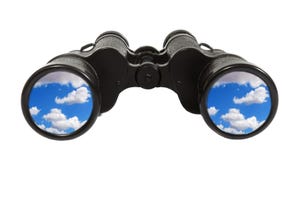Counterpoint: You Don't Have To Be A Busybody To Worry About PrivacyCounterpoint: You Don't Have To Be A Busybody To Worry About Privacy
Bob Evans turns his razor-sharp pen on <a href="http://www.informationweek.com/story/showArticle.jhtml?articleID=177102461">self-styled "privacy advocates" who object to the government subpoenaing search records</a> in defense of the Child Online Protection Act. But you don't have to be a kook to be worried about government setting a big bucket to scoop up thousands of gallons of information about Internet searches.

Bob Evans turns his razor-sharp pen on self-styled "privacy advocates" who object to the government subpoenaing search records in defense of the Child Online Protection Act. But you don't have to be a kook to be worried about government setting a big bucket to scoop up thousands of gallons of information about Internet searches.Here's the backstory: Google said it plans to resist a subpoena from the U.S. Justice Department, seeking information about searches. The Justice Department is looking to reverse a court ruling claiming that Child Online Protection Act anti-pornography laws are un-Constitutional. Google won praise from privacy advocates for standing up to the Justice Department.
Microsoft, AOL, and Yahoo went along with the subpoenas, saying that, since the information was aggregated search queries, no personal information would be conveyed to the federal government and therefore there were no privacy issues involved.
Bob is outraged at the privacy advocates. In an imaginary dialogue with a self-styled privacy advocate, Bob writes: "It seems the only people who are outraged and terrified are you and other so-called privacy advocates. Maybe most regular people think that the bigger outrage is pornographers serving filth up to kids.... "
Well, I have to disagree a bit with Bob there. While I don't see a lot of outraged and terrified people, I do see a lot of people concerned about privacy.
Whenever I talk to people about privacy issues, they're very concerned about what kind of data is being collected about them online and how it's being used. These aren't just self-styled "privacy advocates"--these are people from every walk of life, both in the industry and outside it.
These concerned people include our own Parry Aftab, quoted in our article (see the first link above). You won't find a harder-working advocate for protecting children online than Parry. And even she's got issues with COPA.
Throwing government at the problem of children accessing porn online is not the answer; the answer is better filters. I'm uncomfortable with the notion of government deciding what people should be allowed to read, see, or hear, even when it comes to sex issues.
Perhaps you're comfortable with the Bush administration getting into that business--but would you feel the same way about President Bill Clinton's administration? How about President Hilary Clinton?
I'm also troubled that the Justice Department is looking to defend COPA, going into this study with preconceptions, rather than doing open-ended research into whether COPA is effective, and what the most effective means are for protecting children from pornography. Should the government even be in the business of protecting children from porn?
Moreover, according to its opponents, COPA doesn't just block porn, it blocks sex information. Now we get into an incredibly incendiary area. Most people would agree that children's shouldn't be looking at porn online. But how about these sites?
- Teen Advice: Gay, Lesbian, and Bisexual Issues.
- Planned Parenthood: Birth Control Choices for Teens
- TeensHealth: Sexually Transmitted Diseases
Should kids have information to sex information online? Not pornography--information?
And should the government be the organization that answers that question?
What do you think?
About the Author
You May Also Like






